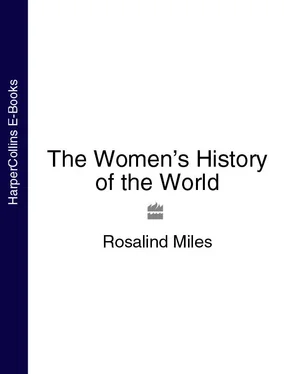Rosalind Miles - The Women’s History of the World
Здесь есть возможность читать онлайн «Rosalind Miles - The Women’s History of the World» — ознакомительный отрывок электронной книги совершенно бесплатно, а после прочтения отрывка купить полную версию. В некоторых случаях можно слушать аудио, скачать через торрент в формате fb2 и присутствует краткое содержание. Жанр: unrecognised, на английском языке. Описание произведения, (предисловие) а так же отзывы посетителей доступны на портале библиотеки ЛибКат.
- Название:The Women’s History of the World
- Автор:
- Жанр:
- Год:неизвестен
- ISBN:нет данных
- Рейтинг книги:5 / 5. Голосов: 1
-
Избранное:Добавить в избранное
- Отзывы:
-
Ваша оценка:
- 100
- 1
- 2
- 3
- 4
- 5
The Women’s History of the World: краткое содержание, описание и аннотация
Предлагаем к чтению аннотацию, описание, краткое содержание или предисловие (зависит от того, что написал сам автор книги «The Women’s History of the World»). Если вы не нашли необходимую информацию о книге — напишите в комментариях, мы постараемся отыскать её.
The Women’s History of the World — читать онлайн ознакомительный отрывок
Ниже представлен текст книги, разбитый по страницам. Система сохранения места последней прочитанной страницы, позволяет с удобством читать онлайн бесплатно книгу «The Women’s History of the World», без необходимости каждый раз заново искать на чём Вы остановились. Поставьте закладку, и сможете в любой момент перейти на страницу, на которой закончили чтение.
Интервал:
Закладка:
Hypatia’s infamous murder signified more than the death of one innocent middle-aged scientist. In Cyril and his bigots, every thinking woman could foresee the shape of men to come. The aggressive rise of phallicism had revolutionized thought and behaviour; but it was not enough. Domination was not absolute, systems were imperfect, there was still too much room for manoeuvre – control could not be based on an organ that men could not control. There had to be more – an idea of immanent, eternal maleness that was not physical, visible, fallible; one that was greater than all women because greater than man; whose power was omnipotent and unquestionable – one God, God the Father, who man now invented in his own image.
All men allow women to have been the founders of religion.
STRABO (64 B.C.–A.D.21)
Behind man’s insistence on masculine superiority there is an age-old envy of women.
ERIK ERIKSON
II
The Fall of Woman
Is it perhaps in a spirit of revenge that man has for so many centuries made woman his slave?
EDWARD CARPENTER
4
God the Father
The birth of a man who thinks he is God is nothing new.
TURKISH PROVERB
As a man is, so is his God – this word
Explains why God so often is absurd.
GILES AND MELVILLE HARCOURT, Short Prayers for the Long Day
Blessed art Thou, O Lord our God, King of the Universe, that Thou hast not made me a woman.
DAILY PRAYER OF HEBREW MALES
‘In the beginning was the Word,’ declared St John, ‘and the word was God.’ In fact the word was a lie. In the beginning, God was not. But as history unfolded in different nations and at different times it became necessary to invent him.
For the assumption of divinity and power from a purely physical base had certain crucial limitations. The human penis, even when inflated to magico-religious status, falls short of godhead. Up to a point, the rising phallocrat had carried all before him. Women’s traditional power based on creation and nature had been systematically whittled away. The Sacred King had stolen from the Great Queen her selective technique of man-management on the Kleenex principle of ‘use and throw away’, and applied it wholesale to the female sex. But brute force could only go so far. So long as women still retained their atavistic power of giving new life, they could not be stripped of all association with the divine.
Additionally, with the discovery of agriculture and the consolidation of tribes into townships, human societies became increasingly sophisticated, requiring structures, systems and administration. Once survival was assured, surplus became property , and man awoke to the glory of being lord and master. To secure ownership and protect rights of inheritance in a more complex society called for something subtler than the indiscriminate deployment of man’s bluntest instrument. And with the increase of organizational structures came greater opportunities for subversion or resistance; every tribe, township, throne-room or temple held women of ingenuity and resource eager to demonstrate that, whatever men’s claim to power, it would not automatically be accepted. These women could not all be destroyed like Berenice or Boudicca, thrown to the dogs and ravens, or hurried to unmarked graves. Achieving power , man reached out for the secret of control ; and as he began to look beyond the end of his penis, he found a stronger lord, a greater master – God.
Male divinity, of course, was nothing new. Isis had her Osiris, and Demeter had been forced to bow to the vengeance of the Lord of the Underworld. Indeed, as phallomania swept the world, male godhead found a new measurement in lost maidenhead; Zeus, king of the immortals, demonstrated his supremacy by the numbers of young women he raped. The new gods of power were equally aggressive and rapacious. The difference was that now each one insisted that he alone was God – he was the One God, the only God, and no one else could play.
For within the short millennium or so that separates the forging of Judaism from the birth of Islam, all the world’s major religions made their début one by one. Immediately each set about the twin tasks of carving out their own community of believers, and annihilating all opposition. Where other male deities were targeted for extinction, what price female divinity? Walking in the garden that had been Eden, Mother Nature met Father God and her doom. In the duel for possession of the soul of humanity she lost her own, as the father god, in Engels’ phrase, brought about, ‘the world historic defeat of the female sex’.
Not all these new religions were god-systems. Judaism offered the paternalistic prototype, once it had succeeded in elevating the petty tribal godlet Yahweh into quite a different order of being after the trauma of the Exile just before 600 B.C. Islam likewise patented the slogan ‘There is no God but God’ following the birth of its prophet Muhammad just before A.D. 600. And straddling the period between the two, lodged at its pivotal mid-point, was the reformed Judaism called Christianity formulated when the old God of the Jews gave birth to a son in whom, as a junior version of himself, he was naturally well pleased. 1
Equally important, though, to India and China respectively, were Buddhism and Confucianism, both of which arose with the birth of their human founders and spread far and fast from these deceptively modest origins. Neither Buddha nor Confucius ever claimed to be divine, and their teachings are properly understood as value-systems rather than as religions proper. But the foundation of their beliefs was uncompromisingly patriarchal; the founders themselves have been worshipped as gods by their followers throughout history; and the ideologies of both these systems have had a remarkably similar impact on women’s lives to that of religions organized around a central concept of a Father God. To women, therefore, the effect was broadly the same, however the message of male supremacy came packaged. All these systems – Judaism, Confucianism, Buddhism, Christianity and Islam – were presented to them as holy, the result of divine inspiration transmitted from a male power to males empowered for this purpose, thereby enshrining maleness itself as power.
Historians, both male and female, have not always resisted the temptation to see the rise of monotheism as a plot against women, since the after-effects have been so uniformly disastrous for the female sex. But attractive though the notion of a cosmic conspiracy is to women’s learned feelings of weakness and helplessness, it overlooks the fact that many of the elements of these early religions held a strong appeal for both sexes, and often for women in particular. Organized religion may have been a root cause of the historic defeat of womankind – Eve did not fall, she was pushed – but it did not begin with that aim. Seen in the wider context of the struggle of human beings of different races towards a deeper understanding of the meaning of their lives and of their growing spirituality, these five patriarchal systems readily reveal why in the first instance they were so attractive.
To begin with, each offered a clarity, a certainty, a synthesized world view that carried a fresh and profound conviction after the pluralistic muddle and overlap of the old gods, and of goddess-worship too. An Athenian woman in labour praying for a safe delivery in the fifth century B.C., for example, had to choose between the Great Mother Cybele, Pallas Athene, or even the virgin huntress Artemis (Diana to the Romans), all of whom had a special care of women in childbirth. Her husband, sacrificing for the birth of a son, could propitiate Ares for a little warrior or Apollo for a poet or musician, but neglected Zeus the king of the gods at his peril. Once all these rival divinities had been caught up into one all-powerful father, whose eye was on every sparrow let alone each of his human creations, or into a firm framework of ‘the Enlightenment’, ‘the One Path’, there was a security that had previously been sought in vain.
Читать дальшеИнтервал:
Закладка:
Похожие книги на «The Women’s History of the World»
Представляем Вашему вниманию похожие книги на «The Women’s History of the World» списком для выбора. Мы отобрали схожую по названию и смыслу литературу в надежде предоставить читателям больше вариантов отыскать новые, интересные, ещё непрочитанные произведения.
Обсуждение, отзывы о книге «The Women’s History of the World» и просто собственные мнения читателей. Оставьте ваши комментарии, напишите, что Вы думаете о произведении, его смысле или главных героях. Укажите что конкретно понравилось, а что нет, и почему Вы так считаете.










